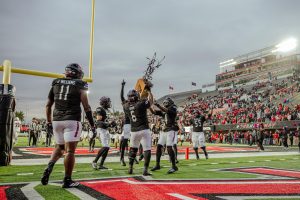Gov. candidates seek to increase dynasties
November 4, 1987
Democratic gubernatorial candidates Wallace Wilkinson in Kentucky and Ray Mabus in Mississippi sought to extend their party’s statehouse dynasties in off-year elections Tuesday, while Philadelphia Mayor W. Wilson Goode battled the comeback candidacy of Frank Rizzo.
Wilkinson, a 45-year-old college dropout who became a millionaire, was rated a heavy favorite over GOP state Rep. John Larper, 57, in Kentucky, where no Republican has been elected governor in 20 years.
Mabus, a 39-year-old state auditor, was favored over businessman Jack Reed, 63, who sought to become the first Republican since Reconstruction to sit in the governor’s chair in Mississippi.
Philadelphia’s mayoral race was the featured municipal contest of dozens on the ballot as Goode, 49, tried for a second term against former Democratic mayor-turned-Republican Rizzo.
Big-city mayors expected to capture new terms easily included Ray Flynn of Boston, William Hudnut of Indianapolis, Kathy Whitmire of Houston and Palmer DePaulis of Salt Lake City.
In Baltimore, Democratic prosecutor Kurt Schmoke bid to become the first black elected to lead his heavily Democratic city.
In Miami, Mayor Xavier Suarez faced opposition from Maurice Ferre, the man he ousted two years ago to win the job.
artford, Conn. chose a new mayor, democratic state legislator, Carrie Saxon Perry, 56, and Republican Philip Steele, 43. Perry would become the first black woman to lead a major Northeastern city.
Gary, Ind., Democrat Thomas Barnes, who ousted veteran mayor Richard Hatcher in a Democratic primary, was heavily favored to win the election.
In San Francisco, where Mayor Dianne Feinstein could not seek a third term, the ballot was crowded with the names of 11 candidates.
Political initiatives dotted the ballot as well, with voters in Maine deciding whether to shut down the Maine Yankee nuclear power plant and Virginians ruling on establishment of a statewide lottery.
Thus ended the last off-year elections of the Reagan era without stirring much excitement nationally.
In contrast to 1985, when both national political parties sought to bolster their standing by pouring resources into races in Virginia and New Jersey, the contestants in this year’s states were generally left on their own.
President Reagan played little role, except to invite Harper of Kentucky and Reed of Mississippi to the White House for picture-taking sessions.
Vice President George Bush traveled to Mississippi in late October to stump for Reed as the party sought to help him in the final days of his campaign.
“I think the 1988 presidential race so dominates the political dialogue that everything else gets drowned out,” said Michele Davis, executive director of the Republican Governors Association.






